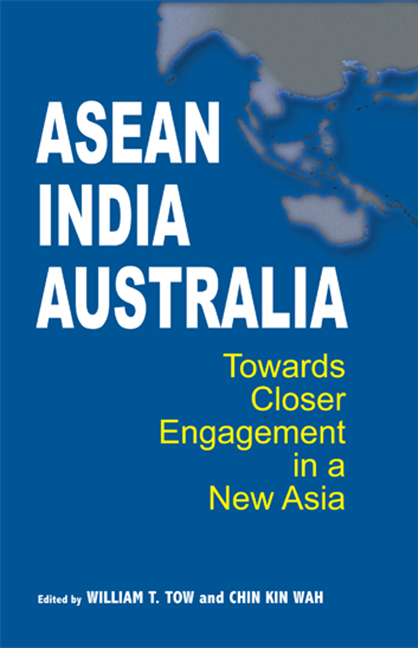Book contents
- Frontmatter
- Contents
- Preface
- Contributors
- List of Abbreviations
- Introduction
- Part I Emerging Regional Security
- Part II Energy Security
- Part III Climate Change
- Part IV Maritime Security
- 11 Australia and Maritime Security in the Northeast Indian Ocean
- 12 ASEAN Maritime Security Perspectives: Enduring Partnerships
- 13 Maritime Security Triangulation of ASEAN-Australia-India: An Indian Perspective
- 14 Governance in Australian Discourse
- 15 ASEAN Charter and Perspectives of Governance and Democracy in Asia
- 16 The Problem of Governance in India
- Part V Law Enforcement/Combating International Crime
- Conclusion
- Bibliography
- Index
14 - Governance in Australian Discourse
from Part IV - Maritime Security
Published online by Cambridge University Press: 21 October 2015
- Frontmatter
- Contents
- Preface
- Contributors
- List of Abbreviations
- Introduction
- Part I Emerging Regional Security
- Part II Energy Security
- Part III Climate Change
- Part IV Maritime Security
- 11 Australia and Maritime Security in the Northeast Indian Ocean
- 12 ASEAN Maritime Security Perspectives: Enduring Partnerships
- 13 Maritime Security Triangulation of ASEAN-Australia-India: An Indian Perspective
- 14 Governance in Australian Discourse
- 15 ASEAN Charter and Perspectives of Governance and Democracy in Asia
- 16 The Problem of Governance in India
- Part V Law Enforcement/Combating International Crime
- Conclusion
- Bibliography
- Index
Summary
The twenty-first century seems set to be the century of governance challenges. The speed with which ideas of governance have moved to the centre of political discourse is startling, and serves yet again to remind us of the dynamic interconnections between conceptual innovation and the implementation of new policies by state and non-state actors. At one level, the emergence of governance discourse is a straightforward response to the challenges posed by globalization, where the capacities of the state seem increasingly under threat. But in another sense, the idea of governance draws attention to important limitations of models of democracy based simply on competitive choice between parties offering themselves for election. The focus of governance is rather on diffusion of power and authority, and on the network as a locus of meaningful political decisions. But none of this should be taken as implying that the field of discourse surrounding governance is well illuminated. On the contrary, while it would go too far to describe the concept of governance as essentially-contested, it is the case that diverse usages are in circulation, often with subtle variations in exactly which forms of social activity they demarcate.
My aim in this chapter is to draw out some of these complexities, and to illustrate them with Australian examples. The chapter is divided into six sections. The first sets out a range of concepts that have been used to capture aspects of political power, with governance constituting the latest addition. The second explores the notion of governance in more detail. The third looks at notions of “corporate governance” as applied to commercial and charitable, humanitarian, and voluntary agencies. The fourth examines Australian notions of “good governance” as reflected in official overseas aid programmes, and the fifth draws out some of the implications of the increasingly popular concept of “global governance”. The sixth argues that in Southeast Asia, regional structures are increasingly reflecting the impact of both formal mechanisms of cooperation and informal norms of governance, which in turn help shape the pathways which countries such as Australia and India must tread if wider regional community building is to succeed.
- Type
- Chapter
- Information
- ASEAN-India-AustraliaTowards Closer Engagement in a New Asia, pp. 243 - 255Publisher: ISEAS–Yusof Ishak InstitutePrint publication year: 2009

